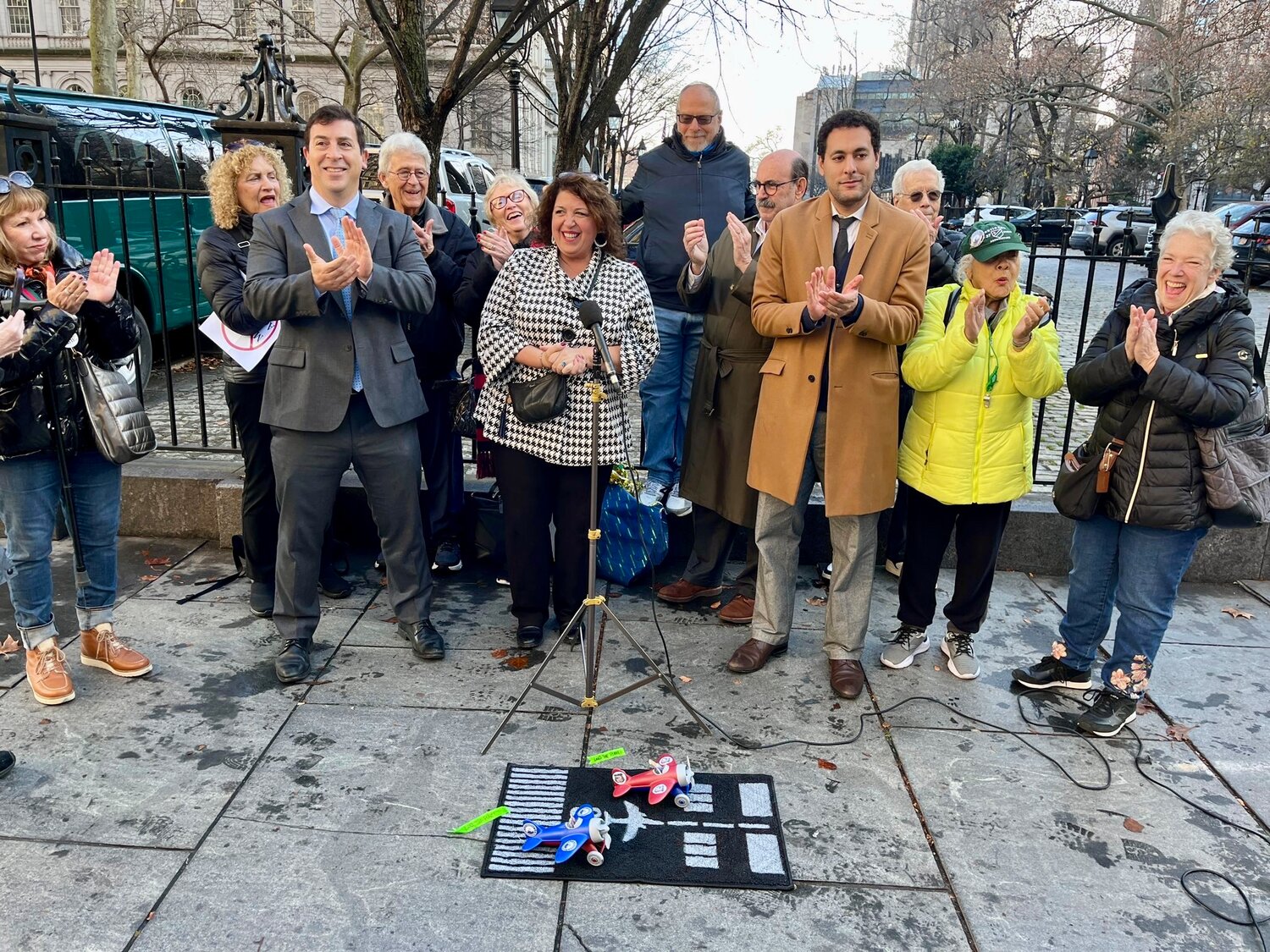Marianne Pizzitola, the president of the NYC Organization of Public Service Retirees, center, and retired municipal workers following the Court of Appeals finding, in December, that the city must continue to pay the cost of health insurance for city workers. City Council Member Christopher Marte is to Pizzitola's left and attorney Jake Gardener is to her right.
Days after the state’s high court OK’d city officials’ yearslong bid to switch 250,000 retired municipal workers to a Medicare Advantage plan, Mayor Adams has pulled the plug on the effort — for now.
In a statement released Friday afternoon, Adams said the city had found “other ways” to address skyrocketing healthcare costs and would not proceed with the plan “at this time.”
The mayor said that while he was “grateful” for the Court of Appeals’ decision green-lighting the retirees’ move to a cost-saving benefits plan, he cited former city workers’ apprehension at the potential switch from their traditional, government-administered Medicare to a privately run, for-profit plan.
“I am grateful to the Court of Appeals for recognizing, earlier this week, that the city has a legal right to offer alternative health care coverage plans to retirees and for acknowledging that we must have flexibility to adapt our policies based on changing times,” Adams said. He called the court’s decision precedent-setting.
“At the same time, we have heard concerns from retirees about these potential changes at numerous older adult town halls and public events, and our administration remains focused on ensuring that New York City remains an affordable place to live,” the mayor continued.
Adams’ about-face was as surprising as it was unexpected, said Marianne Pizzitola, a retired city EMT and the president of the NYC Organization of Public Service Retirees, which has led the fight, in court, online and elsewhere, against the administration’s effort.
Pizzitola said she was “extremely appreciative” of the labor unions that supported the retirees’ contention that moving them to a private plan would break city officials’ assurances that they would be covered by traditional Medicare through their retirement years as well as have access to cost-free, so-called Medigap coverage.
But she said it was imperative that the city move to secure those benefits for the retirees once and for all. “I still believe that something else needs to be done, because no retiree should ever have to go through this again, ever,” Pizzitola said Friday afternoon. “No retiree should have to spend four years of their life, through a pandemic, having to spend money to fund a litigation on a common-sense issue of preserving a federal public health benefit, a safety net, one of the greatest civil-rights achievements ever, that did away with segregation of discrimination in healthcare. No one.”
One way to achieve that end would be for the City Council to pass legislation introduced last year that would preserve the retirees' current benefits. That bill, Intro 1096, introduced by Manhattan Council Member Christopher Marte last October, has not yet come up for a hearing and remains short of the 26 votes needed to pass. Just 16 Council members, along with Marte, have so far signed on as sponsors.
Marte nonetheless called the mayor’s U-turn on the issue “a tremendous victory and a direct result of the relentless organizing efforts of our city’s powerful retirees.”
“It’s a win for public servants, for accountability, and for every New Yorker who believes in accessible quality healthcare,” he said in a statement.
Like Pizzitola, he said it was essential to ensure current retiree benefits remain in place.
“But while this decision is welcome, we have to codify our success. Introduction 1096 remains a critical legislative safeguard to ensure that no future administration can force retirees into restrictive or inferior plans,” Marte said. “We remain committed to protecting retiree healthcare—not just today, but for generations to come…. Our retirees deserve certainty, dignity, and care—not corporate shortcuts and backroom deals.”
The Adams administration, and before that the de Blasio administration, estimated the savings obtained by instituting a privately administered plan at $600 million. Those savings, by way of government subsidies, would be designated for the city’s Joint Health Insurance Premium Stabilization Fund, which supports unions’ welfare-fund benefits, among other purposes.
Adams said he has informed union leadership that the city would take another route.
The executive director of District Council 37, the city’s largest municipal union, Henry Garrido, a steadfast advocate of the proposed switch, also cheered the Court of Appeals’ decision, noting, like the mayor, that it essentially gives the city the authority to institute “alternative health plans.”
“This precedent is important and keeps health care negotiations where they belong—at the bargaining table between the union and the employer,” Garrido said in a statement.
And although he said he would continue discussions about healthcare with city officials, he was also adamant in his suggestion that any savings derived from other options not cost city workers their raises.
“Since the mayor has decided not to proceed with the Medicare Advantage plan, this fulfills the unions’ obligation to generate Medicare-eligible retiree health care savings,” Garrido said. “The savings from the abandoned plan must not come at the expense of our members.”


Spread the word